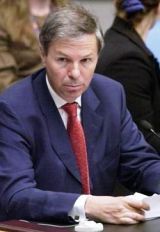UN official challenges Sudan on inclusion of non-African troops in Darfur
By Wasil Ali
November 27, 2007 (UNITED NATIONS) — The UN top peacekeeping official gave a bleak assessment of the progress made on the Darfur peacekeeping force.

Guehenno said that a list of troop contributing countries was put together with the African Union and sent to Sudan early October. He argued that the list was the most optimal in terms of “African character” per Sudan’s request and technical capabilities.
The UN official said that his office has not received a direct response from Khartoum but referred to press reports and statements by Sudanese officials rejecting non-African components of the force.
Last week the Sudanese president, Omar Hassan Al-Bashir, said he would not accept non-African troops apart from Chinese and Pakistani technical units already committed.
But the peacekeeping chief stressed that “there is no alternative for the inclusion of non-African units”. He said that three units have been singled out by Sudanese officials to be excluded from the force, an infantry battalion from Thailand, a Special Forces unit from Nepal and an engineering unit from the Nordic countries.
Guehenno outlined to the UN Security Council why each of these units were selected by peacekeeping operations in terms of deployment speed and the mission critical needs.
UN Security Council resolution 1769 establishing UN-AU hybrid force provided for a transition from the African Union Mission in Sudan (AMIS) to the force known as UNAMID by December 31st.
However Guehenno said that the UN may not be able to meet the deadline set by resolution 1769 as a result of Sudan’s objections to the composition of the force.
“There was cause for concern with regard to public remarks made by Sudanese Government officials who had called into question the African Union-United Nations approach in finalizing force composition” he said.
He further said that Sudan has not given its authorization for the deployment of six helicopters to El- Fasher and UNAMID had not been given permission to fly at night either.
“The mandate to protect civilians does not end at sunset” he said.
The peacekeeping chief also said that UNAMID had not received allocated land in El-Geneina and Zalingei regions in Darfur. The Sudanese government also impounded UNAMID communications equipment for weeks according to him.
“If the government does not give us the land we need, we will have to pull back some units” he warned.
Sudan also wants the Status of Forces Agreement with the AU-UN force to include provisions on communications and the movement of troops and personnel, “which in our experience would make it impossible for the mission to operate,” Guehenno said.
One proposal would allow the government to “temporarily disable the communications network” in case of security operations to protect the country’s sovereignty. The other would require the AU-UN force to provide “advance notification to the government for all staff, troop and asset movements,” he said.
Guehenno also warned Khartoum from reneging on its agreement that the peacekeeping force would wear the blue UN helmets with an AU patch.
On Friday Bashir said the incoming peacekeepers would have to be led by an African wearing an African Union helmet.
“We have been making preparations for peacekeeping troops to wear blue berets. The immunities associated with wearing the blue helmets and the UN insignia which are simply non-negotiable to troop contributing countries” Guehenno added.
Sudan’s U.N. Ambassador AbdelMahmood Abdelhaleem told the Security Council that discussions on the composition of UNAMID should take place in three-way talks between Sudan, the United Nations and the AU, and not in the council.
Abdelhaleem accused UN peacekeeping department of using Sudan as scapegoat “for their failures”.
“You can achieve a lot through dialogue and engagement rather than threats,” Mohamed said. “Things should be done through consultations, through transparency, through dialogue. We are open for that.” he added.
But the UN peacekeeping chief suggested that the time for endless consultations with Sudan on the force is over.
“Extensive and detailed technical explanations has been provided repeatedly including at a high level to the government of Sudan. The remaining and fundamental differences cannot be attributed to lack of consultations” he said.
The Under-Secretary-General for Peacekeeping Operations ended his briefing with a stern warning to UN Security Council.
“If discussions failed to clear the path to the deployment of an effective force, the international community would be confronted with hard choices. Should one move ahead with the deployment of a force that would not make a difference or be able to defend itself, that carried the risk of humiliation of the Council and the United Nations” he warned.
The UK envoy at the UN Security Council, John Sawers, who mocked Abdelhaleem’s speech as “harangue”, said that Khartoum’s “foot dragging and obstruction risks making (deployment) impossible”.
The US representative at the Security Council, Zalmay Khalilzad, warned that the council may have to look into “other measures” to force Sudan to expedite the force deployment.
International experts estimate 200,000 people have died in the conflict, which Washington calls genocide, a term European governments are reluctant to use. The Sudan government says 9,000 people have been killed.
(ST)
